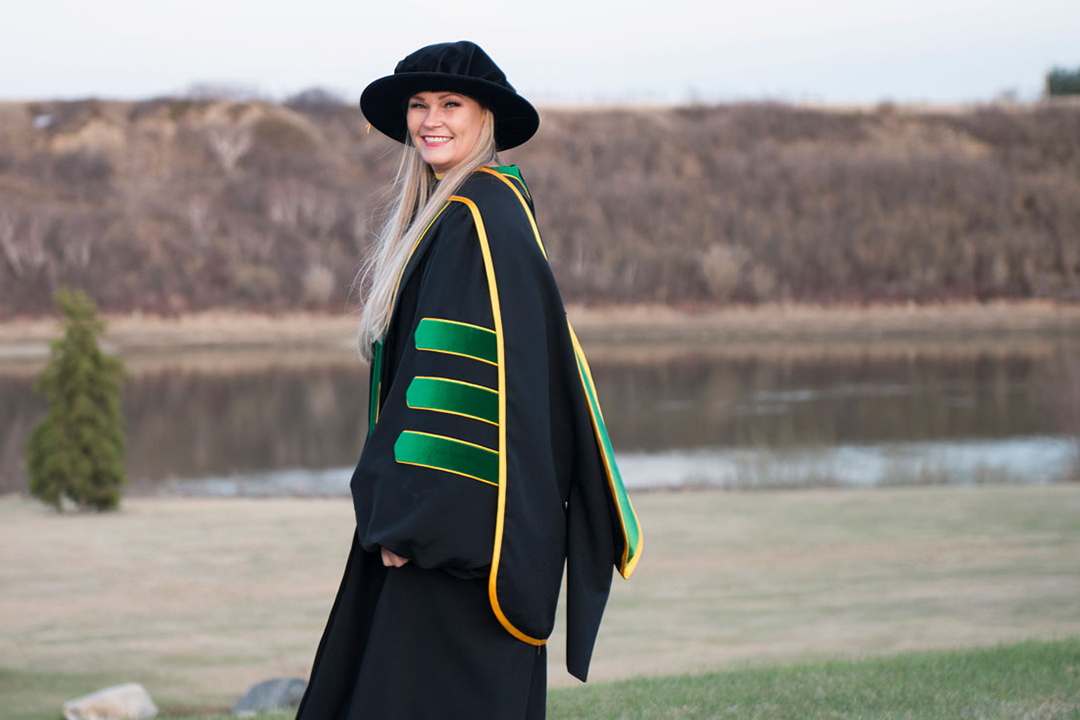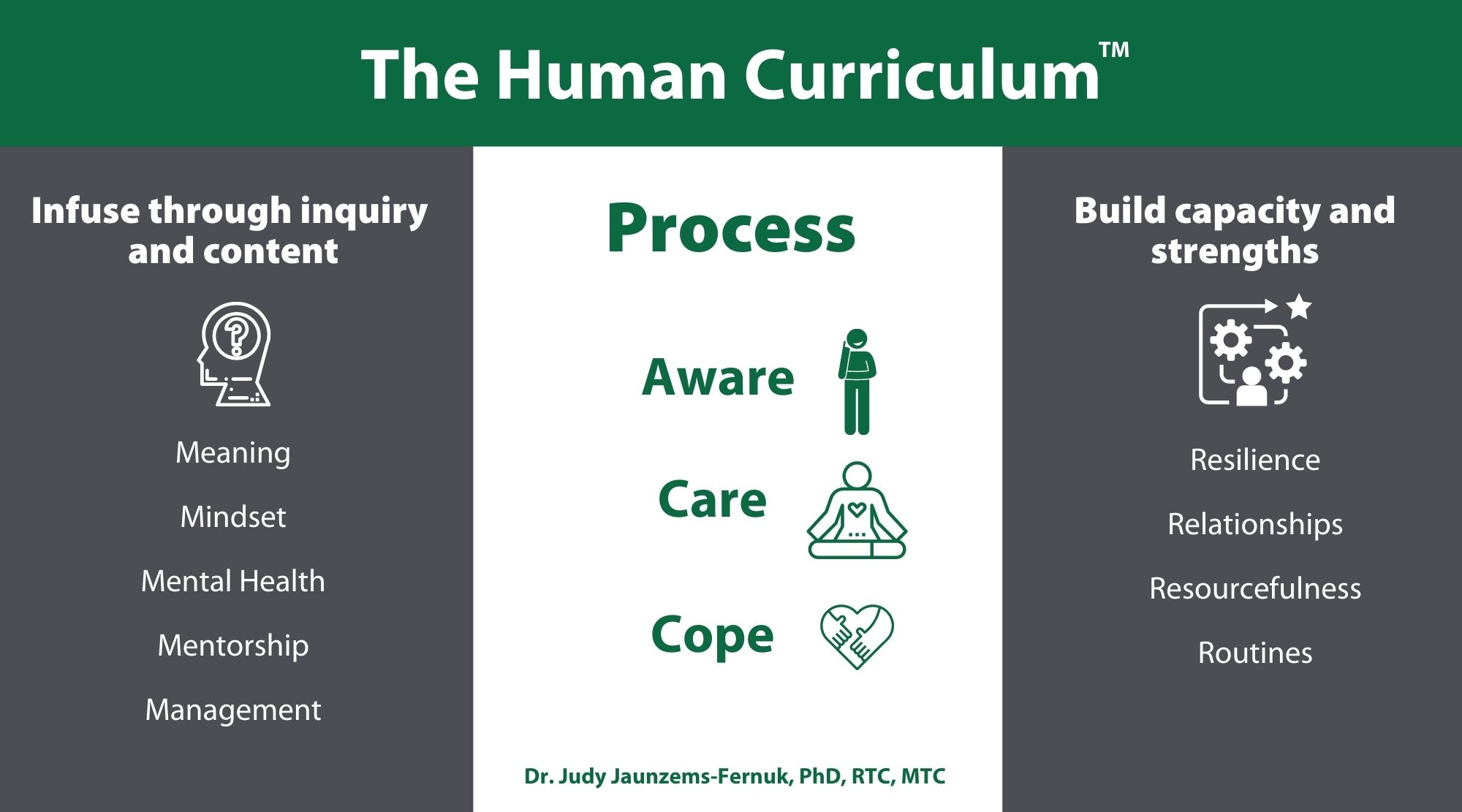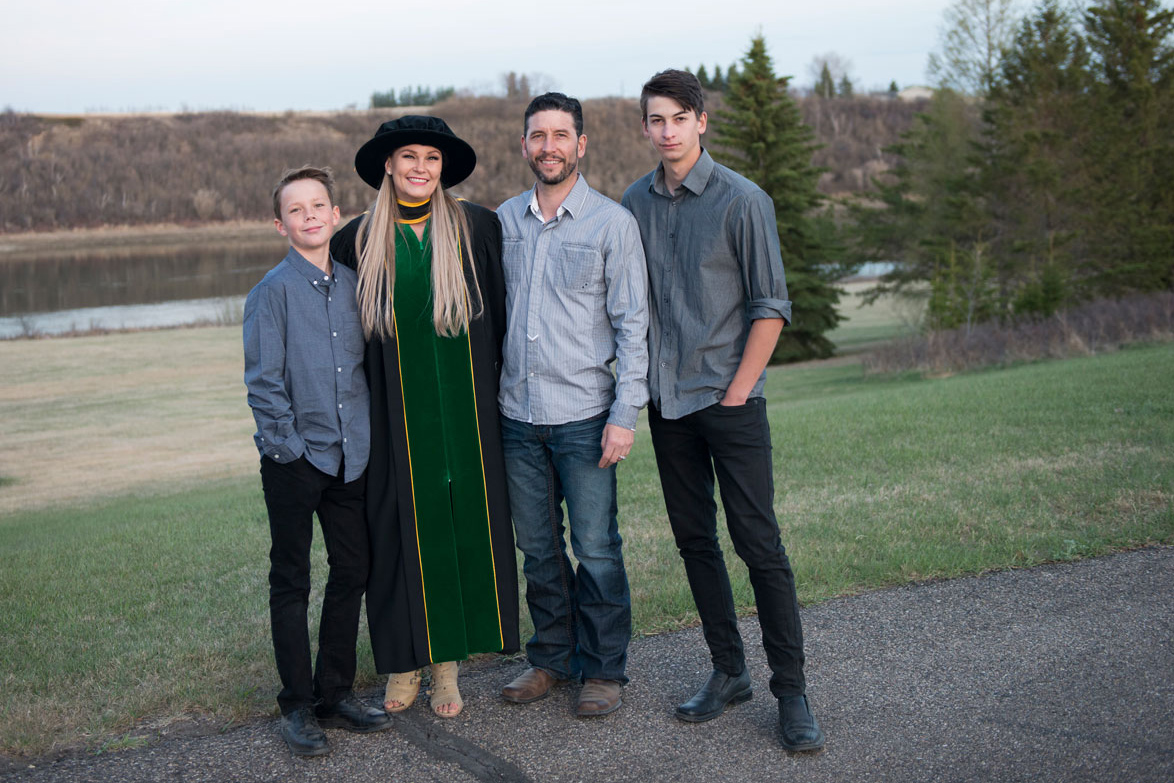
PhD graduate’s research helps teachers avoid burnout
Dr. Judy Jaunzems-Fernuk (PhD) is on a mission to foster calm classrooms where teachers and students thrive.
By Meagan HintherThe University of Saskatchewan (USask) graduate recently earned her doctorate degree from the College of Education in the cross-departmental PhD program. Her dissertation combined educational psychology and curriculum studies to explore what attributes contribute to early-career teacher success.
“I taught K-12 for close to 20 years, and I noticed that during that time the classroom changed from being a relatively homogenous group of students to students who were all over the map with their learning needs, behaviours and mental health diagnoses,” said Jaunzems-Fernuk. “In Saskatchewan, we’re trained as general educators, but I found in the classroom I was doing special education all the time.”
After receiving her Master of Education in 2015, investigating youth at risk of school failure, Jaunzems-Fernuk considered continuing on with a doctoral thesis. She also began pursuing coursework and designation as a Registered Master Therapeutic Counsellor. During this time she was teaching at the Nutana Youth Resource Centre, a hybrid program between the Saskatchewan Health Authority and the Saskatoon school divisions.
“I really found myself drawn to supporting behaviour challenges and mental health challenges, and seeing that, though all of this stuff can get in the way of learning, there are people that really want to succeed,” Jaunzems-Fernuk said.
She began considering what she was observing among her colleagues and reading in the literature: not only were students and their families struggling, but so were teachers. Thirty to fifty percent of North American teachers leave the professions in the first five years, and Jaunzems-Fernuk pointed to a 2019 study by the NDP that found 40 percent of teachers in Saskatchewan said they had seriously considered leaving the profession at some point in their careers.
“You hear: it’s so hard, it’s stressful, we’re so burnt out,” said Jaunzems-Fernuk. “I was loving my career even though I was working with challenging situations, so I thought that I should look to teachers in their early careers who are thriving. What is it that helps them to thrive despite being in a difficult situation?”
Jaunzems-Fernuk worked qualitatively over the course of several months with four teachers who self-identified as thriving and who were working in various school settings and teaching areas.
“What I saw, when I observed them teaching and talked to them, was that they were dealing with really tough stuff. They were in schools where they were trying to support students where there had been suicide, or bullying or major mental health issues,” shared Jaunzems-Fernuk. “These teachers were self-identified as thriving, but they were challenged.”
What Jaunzems-Fernuk found in the qualitative data she gathered and analyzed were four major themes that contributed to early-career teacher success: these teachers were resilient, they were resourceful, they sought out and built relationships, and they had well-established routines.
“Those four things were the anchor for their success,” said Jaunzems-Fernuk. “Were they struggling? Were there challenges? Were they dealing with stress? Yes, but they weren’t burning out. They were describing themselves as surviving and thriving.”

Jaunzems-Fernuk said the next step with her PhD research was to look into what information needs to be taught to students in professional teacher education programs to help arm them with the tools and knowledge to be successful.
“Personally I feel really strongly that to bring strong, effective educators to our youth, they need to understand the content area that they are going to teach, but that’s only half of it,” said Jaunzems-Fernuk. “I think we need content area curriculum and a human curriculum in education. A human curriculum is all about understanding who we are as human beings, and then we can hopefully be more effective educators.”
From the thriving educators she studied, Jaunzems-Fernuk noted five skills were common: they had a sense of meaning and purpose in their careers; they had a mindset that helped them compartmentalize emotions and shift gears as necessary; they had awareness about their own mental health and how to support it; they had great mentors and they had the confidence and competence to mentor others; and they had good classroom management skills and emotional self-regulation.
“Bringing a managed self into the classroom helps manage those chaotic students that may come into the room. That is what classroom management is; it’s relating to people and being there for people. It’s not a program or a reward system,” Jaunzems-Fernuk explained.
Jaunzems-Fernuk has been bringing these concepts into her College of Education undergraduate classes. She’s been an instructor since 2017, and in her most recent undergraduate courses had teacher candidates develop inquiry-led projects that explored one of the five aforementioned skills, such as meaning or mentorship.
“It’s been a phenomenal experience to see the self-growth and the joy in these students as they grow as teachers,” Jaunzems-Fernuk said.
Jaunzems-Fernuk’s supervisor in the Department of Curriculum Studies, Dr. Brenda Kalyn (PhD), shared that her research fills a crucial need in teacher education.
“Teacher candidates today have an unprecedented concern for their own mental health and that of their students,” said Kalyn. “Judy has the key messages that are needed, and she’s continuously exploring new ideas and reshaping her context to support classrooms, teachers and learning communities.”
In addition to the support of Kalyn, Jaunzems-Fernuk credits her husband Darren Fernuk and sons Braden, Jericho and Tristan with helping her on the long journey of completing her PhD. During the latter part of her program, she also tragically lost both of her parents to autoimmune diseases.
“My husband and kids are 50 per cent of this dissertation. Cooking the meals, letting me close my door and work for 17 hours a day at times trying to get through this. It takes a whole team, nobody does this alone,” she said. “My son Braden also edited my dissertation for me and he was amazing. I was blown away.”
Jaunzems-Fernuk looks forward to continuing her work with the College of Education as an instructor, in addition to running her private counselling business, Prairie Sky Education. As always, her focus remains on supporting teachers to build calm classrooms.
“We come into this profession with hopes and dreams about helping people and teaching kids and I always thought, how could that lead to burnout so fast? It’s because it’s so tough, but it doesn’t have to be,” said Jaunzems-Fernuk. “Teachers don’t have to go from passion to burnout. They can go from passion to bumps and passion again. There are things we can do to help with the long journey and the difficult times. It’s about mental health.”


